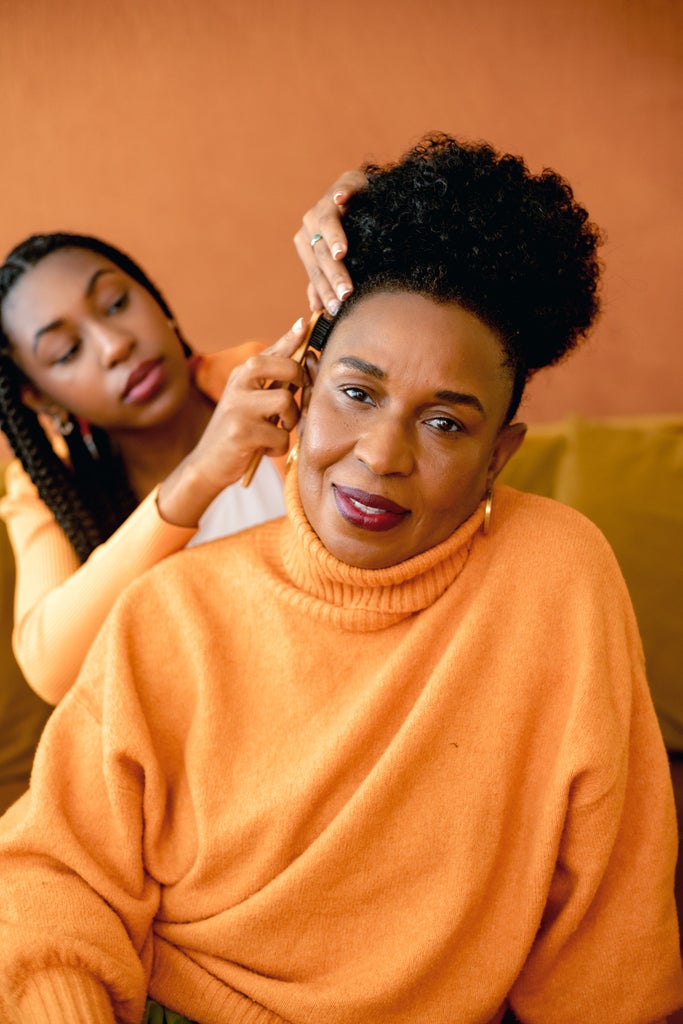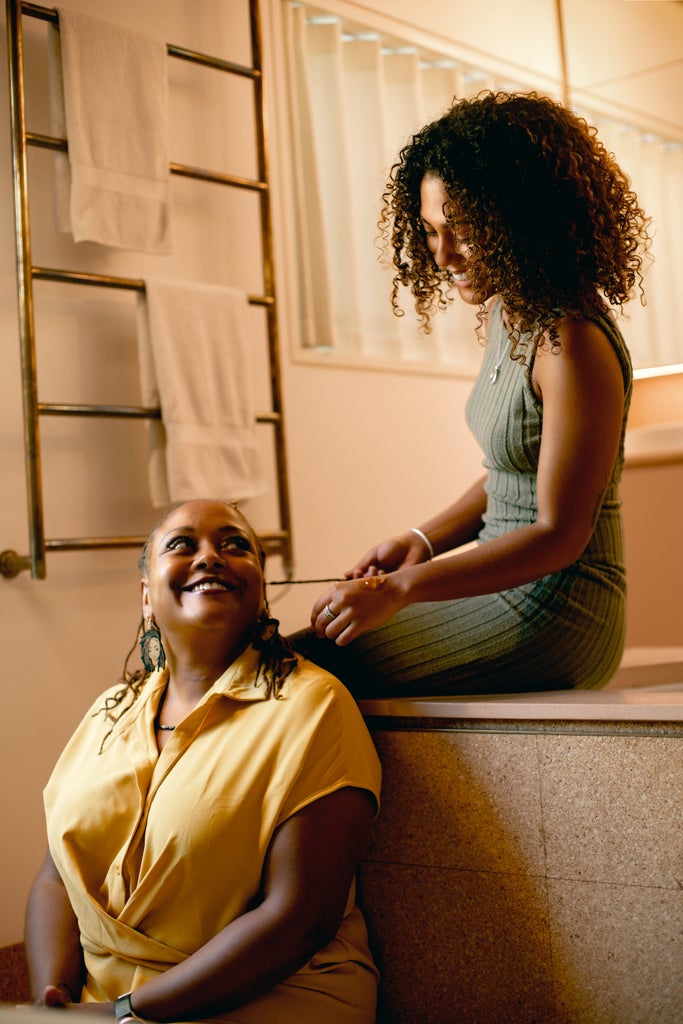When British singer and morning TV regular Jamelia first emerged on the scene as a fresh new pop star back in the early noughties, Black beauty standards were, of course, very different to what they are now (although Y2K fashion trends are hellbent on reviving much of the era’s style). The R&B singer’s first international hit, “Superstar,” was released in 2003, and 20 years later, the music video remains an iconic archetype of Black British noughties style — complete with low-rise jeans, chunky belts and bone-straight hair. When looking back at the early days of her music career and all the style choices that came with it, Jamelia admits that wearing her hair in its natural state wasn’t really an option for a mainstream pop star in 2003. “As a young woman, I didn’t embrace my natural texture because I didn’t see anyone else doing it; there was a lack of representation around me and in popular culture,” she explains to Unbothered over email. “During the early days of my career success, it felt normal to conform to what I now know are Western beauty standards on stage, leading to straightening my hair and erasing any hint of my hair in its natural form.”
Back then, I remember watching Black, British, beautiful and talented Jamelia on (now defunct) MTV Base, awe-eyed and obsessed. What I didn’t realise was that, just like me, the famous star would soon re-examine her relationship with her natural hair. The internet-born natural hair movement had yet to come into the public consciousness, and all I wanted was GHDs, a relaxer and a super straight weave with yaki hair extensions. I spent much of the 2010s with heat damage, as many of my friends did — an all-too-familiar millennial tale. For many Black women who grew up well before natural hair bloggers began sharing self-loving afro hair tutorials on YouTube, the journey to embracing afro hair textures, especially the tightest of curl patterns, was one filled with misinformation, internalised texturism and insecurities. For some of us, it still is. Despite significant commercial progress made in the Black hair care industry (from product innovation to representation in media and advertising), there appears to be unspoken generational differences between Black women and girls who witnessed the far-reaching embrace of natural hair on social media in their formative years and those who didn’t.
Black and mixed heritage women over the age of 45 are “24 times more likely to conform to societal pressures when it comes to their hair compared to 18-21-year-olds,” according to new research by textured hair brand SheaMoisture. The study shows that younger Black women born in the 2000s are vastly more confident when wearing their natural hair than Black women in their 40s, and only half of those over 45 surveyed felt confident enough to try new styles. SheaMoisture claims that 18-21-year-olds are “21 times more likely to have developed better relationships with their hair” now versus how it has been in the past.
If you were exposed to problematic ideas about what constitutes as “good hair” — whether from outdated Black comedy sketches or elders with outdated ideas about Black beauty — these survey results may not be surprising. As history tells us, Black hair has been routinely politicised, scrutinised, and policed throughout generations, so much so that inheriting negative feelings about afro hair textures is, sadly, very normal.
Between more Black hair products becoming available in mainstream stores to seeing far more textured hair representation on TV, we’re often told that things have changed for the better. Fingers point towards the natural hair movement as the catalyst for the noticeable shift in attitudes towards Black hair. Though the roots of the natural hair movement were first established in the 1960s, amidst the Civil Rights era, it was revived in the 2010s via YouTube. While the overall success of the natural hair movement is widely debated across social media platforms, especially when it comes to the treatment and acceptance of 4C hair, few would argue with the idea that, at the height of their popularity, Black creators helped raise a whole generation of Black teens on their self-loving natural hair tutorials. It’s the very reason why, if you ask my younger sister (aged 20) what she thinks about her natural hair, she only has a few words: “I love it.” She then shrugs as if the question itself is entirely redundant — because why wouldn’t she love the hair that grows out of her own scalp?

“The biggest influence in helping me love and appreciate my natural hair more has been becoming a mother,” says Jamelia, now in her 40s and a mother of four. The singer is fronting Shea Moisture’s ‘Same Roots, New Rules’ campaign to help raise awareness of the generational struggles faced by Black women with curly, coily, and wavy hair. In a heartfelt photo series, Jamelia is pictured alongside her teenage daughters as they style her large and thriving afro. In more photos (pictured), Black mothers and mother figures are pictured having their natural hair taken care of by the younger Black women in their lives. The campaign intends to portray each woman with the dream hairstyle they felt they could not wear growing up due to hair discrimination.
“It was very important for me that my daughters have a more positive relationship with their hair and embrace their natural hair textures from an early age,” Jamelia continues. “Styling their hair and witnessing their joy and confidence grow has been fundamental to my confidence. They have inspired me to do the same and leave all the negative thoughts behind.”
According to SheaMoisture’s survey, 72% of Black women over 45 think there is “a more positive representation of afro and textured hair in the media now compared to when they were younger” and “believe the next generation will feel even more empowered to wear their hair how they please”. While this may be true, it’d be wrong to suggest that we’ve entered some form of Black hair utopia in 2023. There is still work to do when it comes to eradicating hair discrimination in schools and workplaces in the UK and beyond. However, it does seem that, whether in protective styles, free-flowing or loc’d, there are fewer obstacles preventing Black women from their self-expression right now, no matter the age.

I’m reminded of everyone’s favourite niece Blue Ivy and how Beyoncé’s and Jay-Z’s eldest daughter was subject to intense scrutiny and, frankly, cruel conversations about her natural hair as a baby. As Wisdom Iheanyichukwu explained in an article titled ‘Leave Blue Ivy’s Hair Alone,’ two-year-old Blue Ivy was “constantly mocked for having type 4 hair, which is the most common hair type amongst the majority of Black people.” Fast-forward to now, the preteen Blue Ivy has just finished performing alongside her superstar mother at multiple stops of the Renaissance World Tour, wearing her crown of afro hair in various glorious natural and protective hairstyles. I may be overly optimistic, but if Blue Ivy is part of the next generation of pop culture icons, I can’t but think that the kids will be alright.
But what about the rest of us? I learned to love my hair sitting on the floor between my mother’s legs as she carefully cornrowed my hair into intricate patterns, shiny with grease. Still, it wasn’t long before I learned to hate my hair outside in the world, at school, at work and in social groups. As a thirty-something, I’ve often asked myself, How do I unlearn so many years of harmful lessons? And, how do I ensure that I don’t pass on my own insecurities to the next generation?
“For so long, the representation of afro and textured hair within society and media has been so limited. The lack of this representation has led to a lack of confidence for women with curly and coily hair to wear their hair naturally. Now, more than ever, women with afro and textured hair are learning to fall in love with their natural hair,” says Loraine Frimpong, Shea Moisture’s Assistant Brand Manager.
“It’s important for us to shed light on the relationship mothers and daughters have with their hair,” Frimpong continues. “Mothers have been uplifting their daughters and supporting them to wear the hairstyles they truly desire… we want to celebrate mothers and allow them to finally wear the hairstyles that they have always wanted but were never encouraged to wear when they were growing up.”
Like what you see? How about some more R29 goodness, right here?